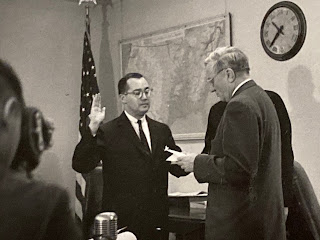Tribute from Rabbi Seth Limmer: Chicago Tribune
How ex-FCC chief Newton Minow shaped me as an advocate and human being
America lost a titan last week with the passing of its proud son Newton N. Minow. And Chicagoans of many stripes — colleagues from the Adlai Stevenson campaign, viewers of WTTW-Ch. 11, partners at Sidley Austin, Tribune op-ed readers and friends who shared bookbinder soup at the Cape Cod Room — have lost one of those remarkable figures who was simultaneously a living legend and an incredibly down-to-earth mentsch, a truly human being.
I count myself fortunate to have come to know Newt, and his beloved Jo, during this past decade. Not surprisingly, our relationship began with words printed in publications. As memories of Newt come to my mind, I share three of these stories in tribute to the kind of man Newt was.
Nearly a decade ago, a handwritten letter arrived at my New York home. The author had come across an op-ed I wrote on the 20th anniversary of the assassination of Israeli Prime Minister Yitzhak Rabin; I had reflected on the importance of that event to my generation and drew parallels to the impact of the assassination of President John F. Kennedy on generations before me. This letter was incredibly complimentary. After offering to host me for dinner upon my move to Chicago, the letter writer concluded with the words, “I so appreciated reading your words on history. Here is a little something I wrote reflecting on the same historical event.” Included in the envelope was an article from The Atlantic titled, “How We Should Remember John F. Kennedy.” It was only then I realized the man who took the time to write this generous and kind note to me was a member of Kennedy’s administration!
That was the first time I remember seeing the name Newton Minow in print.
A few months later, Newt and I began a ritual that continued to this year. I had co-authored an essay in the Tribune about the need for comprehensive immigration reform. With the two of us now connected by email, Newt sent me a note that congratulated me for taking a stand and offered a few political pointers.
The praise was gratifying, but it was far more important to get inside advice on whom to contact on Capitol Hill to help with the effort! From that spring day nine years ago, every time I’ve been fortunate enough to have an essay run on the Tribune’s pages, a note from Newt was always in my inbox with words of praise and helpful suggestions to find success for whatever cause I was advocating.
It went both ways. Newt was regularly featured in the Tribune, and I would always write him a quick note after seeing his words in print. One time, I felt a need to question the ideas he advanced in his column. Taking issue with Newt’s political position was something I did after careful consideration. A few minutes after I clicked “send” on the email, my phone rang: Newt, of course. We shared a lovely conversation, ultimately agreeing, as friends, that we simply had different opinions on the matter.
I recall hanging up the phone and reflecting on just how incredible a person Newt was: I was a relative kid, less than half his age, questioning his judgment on a key political issue of our time. Instead of being insulted or ignoring my critique, Newt called to engage as equals, so that we both might grow from the intellectual interaction. A special man indeed.
Two years later, my phone rang. It was Newt. Remembering our conversation, Newt simply said, “Well, Seth, it turns out you were right. I just thought I owed you a phone call to let you know.”
A friend who remembers a conversation. A thinker who recalls views divergent from his own. An elder statesman with the honesty and humility to admit he missed the mark. This, and so much more, was Newt.
During the days after his death, I can only reflect: This is the kind of leader, the kind of public servant, America needs. Now, more than ever.
Newt did serve America in many ways. During the Kennedy administration, Newt led the Federal Communications Commission. Foremost among his lifelong commitments to America’s channels of communication was that they should serve the public interest. Bipartisan presidential debates were a lifetime focus, quality children’s programming was a passion and, yes, Newt did call television “a vast wasteland.”
In his life’s work, and in the words he shared in the Tribune and in print throughout the world, Newt demonstrated his belief that the purpose of media was to foster meaningful debates that would advance and strengthen democracy. Newt knew that, of late, media was as much a contributor to the problem of our eroding societal norms as it was potentially a solution to heal our fractured society.
As he wrote two years ago in the introduction to “Saving the News” — a book written by none other than Newt’s daughter Martha — he bemoaned the reality that “the basic concept that our communication systems are to serve the public — not private interest — is now missing in action.”
Newt lived the message that our media can teach, illuminate and even inspire but “only to the extent that humans are determined to use it to those ends,” as broadcast journalist Edward R. Murrow said. As we mourn his loss, may we assume the mantle of his legacy and work toward a world in which our media truly instruct, illuminate and — like my friend Newt — serve as a constant source of inspiration.
Rabbi Seth M. Limmer is the founder of Open Judaism.

Comments
Post a Comment